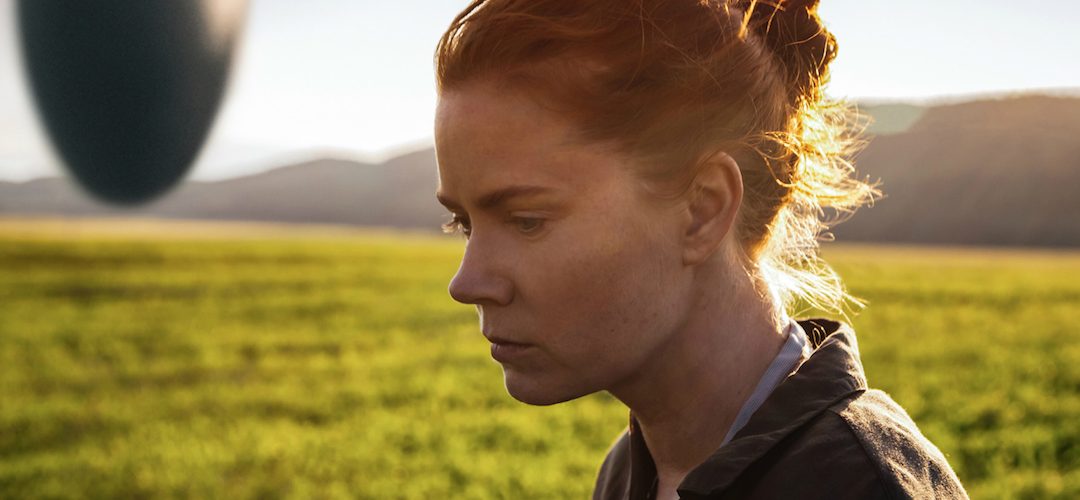Hi, and welcome to the penultimate entry in my film criticism series. As I explore the science fiction genre, my last post on Denis Villeneuve’s Dune and its prophetic visions has led me to the filmmaker’s earlier sci-fi installment, Arrival (2016).
“Despite knowing the journey and where it leads, I embrace it, and I welcome every moment of it.” Louise’s (Amy Adams) final voiceover in Arrival perfectly encapsulates its most important theme: the importance of living for the present. In spite of Louise fulfilling a future that seems predestined, the film insists that life has value, directly contrasting the stance that other sci-fi movies with similar narratives tend to take. For instance, Terry Gilliam’s 12 Monkeys (1995), ever relevant to this blog series, employs a similar time-loop narrative device in order to suggest that life is meaningless: James Cole (Bruce Willis) attempts to alter his present by changing the past, but instead ends up fulfilling the past events that he sees in his dreams. As a result, humanity is inevitably decimated, and James questions whether humanity deserves to live anyway (which I cover here). The film asks: if nothing can be changed, what is the point of trying? And, if the future is set in stone, what is the point of living? Although time-loop narratives often affirm nihilism, the belief that nothing has value, Arrival rebukes it by challenging determinism and endorsing mindfulness.
While Arrival’s plot may seem to imply at first glance that the future is predetermined, thereby validating nihilism, it actually challenges this notion. In Dune, Paul (Timothée Chalamet) sees visions of the future that imply that he is the messianic “One,” so he embraces this path, believing it to be his destiny and calling rather than his choice (which I go over in more depth here), despite premonitions of an apocalyptic war fought in his name. Louise similarly sees a future in which she falls in love with Ian (Jeremy Renner) and has a lovely daughter, however, he eventually leaves her, and their daughter goes on to die of cancer. Like Paul, she embraces this future, but, conversely, it is not because she believes it to be unavoidable or fated. Indeed, she wonders whether she ought to change the outcome, inquiring of Ian in the final scene whether he would change things if he knew his own future. Because she knows not only her past and present but also her future, the principle of cause and effect is made nonlinear. Just as the choices people make every day are informed by their past experiences, each choice that she makes in the present is also directly informed/affected by her knowledge of where that choice will lead. Unlike James Cole, who tries uselessly to change events that have already happened and unassumingly ends up fulfilling those events, Louise consciously chooses her path, with her present and future knowledge continually affecting one another and feeding into her agency.
Arrival further combats nihilism by instead affirming mindfulness. Mindfulness is a practiced defined as “maintaining a moment-by-moment awareness of our thoughts, feelings, bodily sensations, and surrounding environment, through a gentle, nurturing lens… [tuning] into what we’re sensing in the present moment rather than rehashing the past or imagining the future.” Mindfulness challenges one to find meaning in the present experience instead of in what has already passed or what may come to be. This is why Louise chooses to fulfill the future she envisions: she believes that the moments she will have along the way with Ian and their daughter are enough to justify the pain that will follow. Although she knows where her path is headed, the value of their daughter’s life and the love they will experience make it all worthwhile. She may not have ever pursued a romance with Ian or agreed to have a baby—as seen in the final montage—if not for her visions, but this does not mean that the choices are not hers. Her awareness has simply expanded, and her newfound knowledge has shown her a future that she chooses to create.
We are soon coming to a close, with my sights set on Gavin Hood’s 2013 Ender’s Game—adapted from Orson Scott Card’s eponymous novel, a sci-fi staple—for my final post. See you then.


Recent Comments